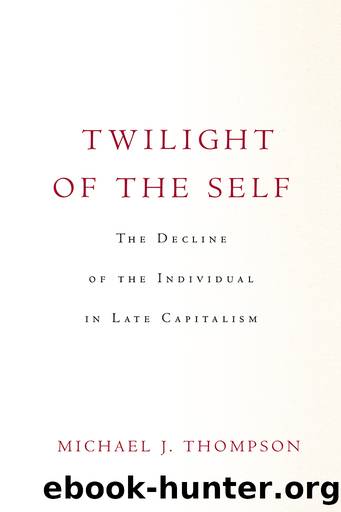Twilight of the Self by Michael Thompson

Author:Michael Thompson
Language: eng
Format: epub
Publisher: Stanford University Press
Published: 2022-06-15T00:00:00+00:00
Another aspect of the argument I want to explore here is what reification actually inhibits in oneâs social agency. In this sense, the theory of reification must not only be diagnostic with respect to the problems of rational reflection within subjects, but it must also be normative in the sense that it can make evident that which is being blocked by reified consciousness itself. This second aspect of the argument is rich with possibility insofar as we see reification as hiding or even distorting our cognitive capacity to grasp the social-ontological structure of our world. What I mean here is that reification is not only a process whereby things that are human become nonhuman objects, but, more importantly and, I think, more accurately, it distorts and misshapes our cognitive capacity to see our world as cooperative, interdependent, and constituted by our actions. In this sense, it robs us of what Marx saw as crucial for any sense of social transformation: a conception of our species as self-conscious of our own sociopoietic capacities. In this sense, reification renders consciousness nondialectical.
It is true that reification cannot beâindeed, no concept can ever beâexhaustive in its diagnosis of the problems of capitalist society. But reification comes as close as any of its competitors to such a category. Nancy Fraser, for one, has argued that âwe must replace the view of capitalism as a reified form of ethical life with a more differentiated, structural view.â1 I do not believe this observation is correct. More than any other time in capitalist society, we can see our world as sustained by a culture of internalized, implicitly valid norms and worldviews with respect to the social goals posited by capitalist imperatives. More than any other time in the history of capitalism, we are witnessing a decrease in class conflict and an increasing stability of the systemâs legitimacyâall of this despite obvious and well-publicized accounts of corruption, inequality, social pathologies, and other social defects. I want to suggest a widened conception of reification that is still rooted in the basic thesis put forth by Lukács in 1923: that consciousness has become colonized by heteronomous patterns of social life that have themselves been saturated with quantification, administrative reason, and exchange value. But as I see it, this basic thesis must be enlarged to confront what I think is a core pathology in modern culturesânamely, the degradation of agency and the self and its incapacity to articulate concrete alternatives to the prevailing social order.
The central thesis of this chapter is that the concept of reification has to be expanded and cultivated into a richer theory about the nature of defective social consciousness in order for us to come to terms with the acute erosion of moral and political agency in modern societies. The idea is not that reification follows simply from the logic of commodification. Rather, capitalist society as a social formation consisting of certain kinds of social relations larded thickly with norms and value orientations has a strong constitutive power in forming the consciousness and personality of subjects.
Download
This site does not store any files on its server. We only index and link to content provided by other sites. Please contact the content providers to delete copyright contents if any and email us, we'll remove relevant links or contents immediately.
Chaco's Northern Prodigies : Salmon, Aztec, and the Ascendancy of the Middle San Juan Region after AD 1100 by Paul F. Reed(367)
Digital International Relations by Unknown(366)
Law Enforcement Interpersonal Communication and Conflict Management by Brian Douglas Fitch(358)
Skilled interpersonal communication: Research, theory and practice, Fifth edition by Owen Hargie(338)
The Enduring Color Line in U.S. Athletics by Krystal Beamon Chris M. Messer(337)
Critical Perspectives on Human Security : Rethinking Emancipation and Power in International Relations by David Chandler; Nik Hynek(336)
EPSO CAST Political affairs EU policies: How to succeed in the selection procedure by Franco Reverte José María(312)
Evidence-Based Policy Making in Labor Economics by Hamermesh Daniel S.;Nottmeyer Olga K.;Nottmeyer Olga;King Sarah;King Sarah;King Sarah;(309)
Writing Public Policy - A Practical Guide to Communicating in the Policy Making Process by Catherine F. Smith(288)
Criminological Theory in Context by John Martyn Chamberlain(285)
Rothschild and Early Jewish Colonization in Palestine (Geographical Perspectives on the Human Past) by Ran Aaronsohn(279)
Tibeton Yoga Its Secret Doc by Evans-Wentz(277)
Threshold Concepts in Women's and Gender Studies by Christie Launius Holly Hassel(273)
Social Problems, Social Issues, Social Science by James Wright(271)
Positive Psychology and Spirituality in Counselling and Psychotherapy (Conflict, Ethics, and Spirituality, 12) by unknow(269)
Cognitive Development in Infancy and Childhood (Elements in Child Development) by Mary Gauvain(262)
Play in child development and psychotherapy: toward empirically supported practice by Sandra W. Russ(261)
Latin American Politics and Society by Gerardo L. Munck & Juan Pablo Luna(238)
What Makes a Social Crisis?: The Societalization of Social Problems by Jeffrey C. Alexander(227)
